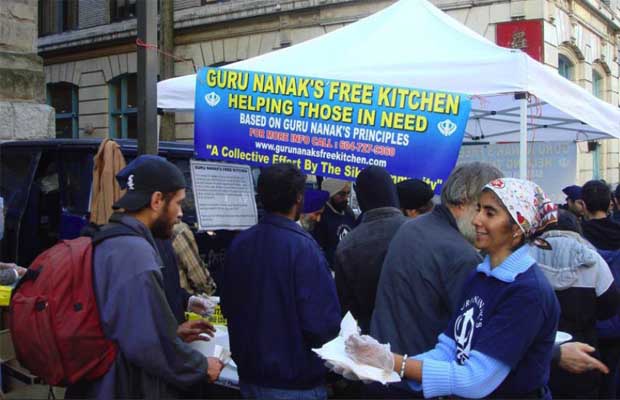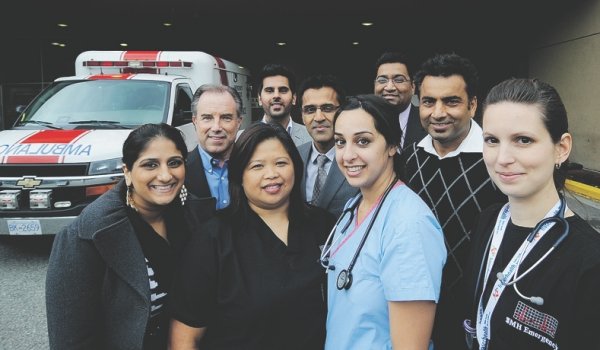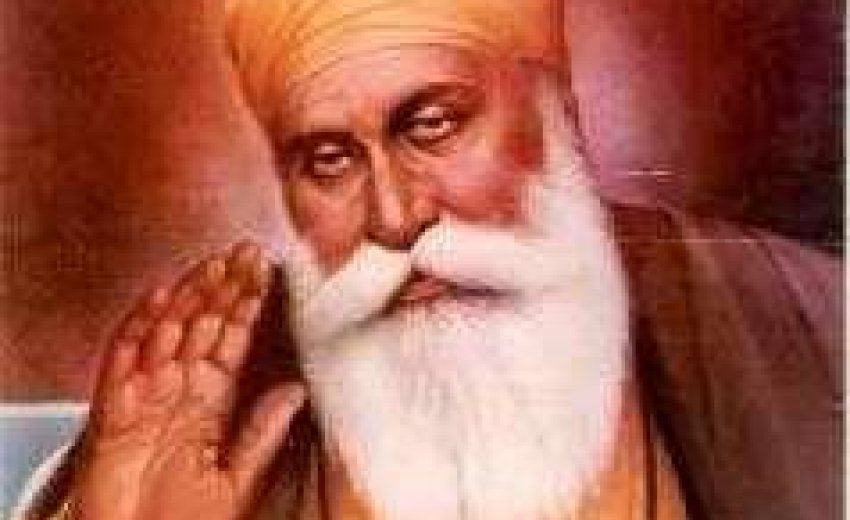 |
| Photograph by: Photo submitted, The Province |
| Volunteers from the Guru Nanak Free Kitchen hand out meals at the corner of Main and Hastings in Vancouver. |
As the legend goes, Nanak Dev was only 12 when his father, a revenue official of Talwandi village west of Lahore in Pakistan, decided to test the business acumen of his son.
The boy, who had already impressed his teachers with a mastery of languages and a spiritual forbearance was given 20 rupees and told to go find a business. On his trek, Nanak Dev came across a band of wandering holy men in the forests. Seeing they were hungry and destitute, he used the 20 rupees to buy them food.
On his return home, empty-handed, Nanak Dev was punished by his furious father who wanted to know why he had given away the small fortune.
Nanak Dev, who would go on to become the founder of Sikhism replied that he had done a "true business" by serving the poor and hungry.
Today at the corner of Main and Hastings in downtown Vancouver, this selfless service by Nanak Dev will be reflected in the actions of a group of Sikh-Canadian professionals who will be feeding the hungry and destitute, just like their first Guru did some 500 years ago.
"This is just one way how the teachings of Guru Nanak have influenced the community here in Vancouver," said Sukhninder Singh, a software company project manager, who helped establish the volunteer-run Guru Nanak Free Kitchen four years ago.
Today's event, one of dozens staged regularly by the group which has over 500 volunteers, mainly Sikh-Canadian professionals, is especially special as it coincides with the 541st birth anniversary of Sikhism's founding father, Guru Nanak.
About 400 Indian meals comprising chick peas, chapattis, lentil curries, rice pudding and Indian tea were prepared over the last 24 hours in the communal kitchen or langar of the Sikh temple in New Westminster for the event
"Guru Nanak taught us to honour and respect people from all walks of life and the concept of Langar or the community kitchen provides us, Sikhs and non-Sikhs alike, a vehicle to practice service to humankind," said Sukhninder Singh.
Guru Nanak appeared in India in one of the darkest periods of its history when the human scene was full of religious strife supported by long entrenched superstitions, the rule of invaders from abroad and the zeal for religious persecution.
He preached a religion of compassion, understanding, love and sacrifice, universal brotherhood, equality of women, tolerance and respect for all religions after establishing Sikhism in 1469.
For Guru Nanak, the true religion is the falling in love with God.
His message has become increasingly relevant in the present day world of turmoil, conflict and hatred said Dr. Pargat Singh Bhurji, a pediatrician and neonatologist in Surrey.
"Treat every living thing with respect . . . it starts with that one truth," said Bhurji, who has raised funds for B.C. Children's hospital, founded a pediatric clinic for the victims of the tsunami disaster in Sri Lanka and volunteered his expertise in earthquake-devastated Haiti.
" Sewa or sacrifice by feeding the poor, protecting the weak and defending the helpless is a prosperity cashout . . . The teachings of Guru Nanak tell us that to do good you must go to the needy, not the other way around, where they come to you," he said.
Going out to seek the needy in the footsteps of Guru Nanak is something Giani Narinder Singh, the head priest or granthi of the Gurdwara Dukh Nivaran Sahib in Surrey, does virtually every day.
Born in Punjab, the youngest of eight boys and one girl, the granthi spends his time with inmates of the detention centres of the Fraser Valley, the infirm at Surrey Memorial Hospital and the sick at their home when not conducting the daily morning and evening prayers for his flock.
"This is not about teaching those I visit about Sikhism but the religion of humanity," said the keeper of the scripture at the Gurdwara Dukh Nivaran Sahib.
Over at Surrey's Dasmesh Darbar Sikh temple, the focal point of the mammoth Vaisakhi celebrations every spring in the Lower Mainland, the fundamental concepts of Sikhism -- Kirat Karni, Wand Chhakna and Nam Japna reverberate in a congregation of givers.
"We serve God by serving other people every day," said contractor Babar Singh Tumber, who with his family spends an average of about four hours a day at the temple, cooking in the kitchen and cleaning the floors.
"This is one way we can symbolize our devotion to God, and the sacrifices or sewa we do for all people reflects the diversity and multiculturalism that is Canada," said Tumber
Explaining the basic tenets of Sikhism, Dasmesh Darbar Sikh temple vice-president Major Singh Tumber, said the principal of Kirat Karni means earning a living by hard work and honest labour.
The ideal of Wand Chhakna involves the sharing of one's prosperity to ensure the gap between the haves and the have-nots is closed while Nam Japna means recitation of the name of God in everything you do to in the spirit of universal brotherhood.
"Today is a very big day for the Sikh community . . . a day when these ideals are re-affirmed by words and actions ... If we keep these ideals in our hearts and minds every day, there can be no better tribute to Guru Nanak Dev ji," said Tumber.
 |
| Photograph by: Arlen Redekop, PNG, The Province |
| Red FM radio employees with Surrey Memorial Hospital staff. (Left to right) Dalpreet Bains, Ron Knight of SMH Foundation, Evelyn Sanchez (SMH E. R)., Tony Sanghera, Kulwinder Sanghera, Hania Chahal (SMH E. R)., Bijoy Samuel, Amrik Cheema, and Alea Beuer (SMH E.R.) |
The man who founded our religion
'This is a community that understands generosity'
Surrey Memorial Hospital Foundation salutes the South Asian community
[By Sam Cooper, The Province]
http://www.theprovince.com/life/This+community+that+understands+generosity/3862314/story.html
When Karanvir Sidhu's young son Gavin was diagnosed with a brain tumour in 2006, the father had to put all his trust in the doctors at Surrey Memorial Hospital.
Karanvir and his wife Sukhjit were already donors to the hospital's foundation, but they were so pleased with the results of Gavin's successful surgery -- and his excellent ongoing treatment in the hospital's pediatric oncology centre -- that they decided to make a special donation.
"They did a great job, and we were so happy," Karanvir Sidhu said. "So we felt we could save the lives of some other children with our gift."
The family's gift will help double the amount of children that can be treated at the centre, says Jane Adams, president of the Surrey Memorial Hospital Foundation.
Adams says the Sidhus "so very thoughtful" giving is a great example of the rising tide of donors in B.C.'s South Asian community, who are helping the hospital meet growing needs.
In fact the main entry to the hospital's new Emergency Centre, due to open in 2013, will be named the Guru Nanak Emergency Services Front Entrance, fulfilling the wishes of community members who have donated over $2.2 million to the foundation over the past three years.
With the large donation, the community was given the opportunity to name the new emergency entrance. "They said we feel a great sense of belonging at Surrey Memorial Hospital, so why don't we name [the new emergency center entrance] for the man who founded our religion?" Adams said.
With the addition of the new emergency centre and the tower that will anchor it, to be completed in 2014, the hospital will grow to 630-bed capacity, from 499 today.
As Surrey's population explodes past 500,000, the charitable giving from the South Asian community is key to the benefit of all who will be treated at the hospital, Adams said.
The main thrust of the fundraising drive for the foundation was a series of three annual radiothons put on by Surrey-based Red FM.
Over the past three Novembers, the station galvanized B.C.'s South Asian community, drawing a flood of donations totalling $2.2 million.
Adams, who attended the radiothons, says she was amazed as people lined up outside the station -- everyone from young children emptying their piggy banks to taxi drivers giving the whole take from 12 hour shifts -- to be part of the community spirit.
"This was the single most effective radiothon in Canadian history," Adams says.
"It was astounding -- it was an overwhelming thing."
Kulwinder Sanghera, owner of the four-year-old multicultural station, said: "It's clear the South Asian community is very generous. I get tears when I think that some people who have only been in Canada for two or three months hear the radiothon and want to donate."
Sanghera says B.C.'s South Asians got behind the station's message that the hospital is at the heart of the community's needs.
"We conveyed the idea that we will all be using the hospital, so let's help improve it."
Adams adds that the gifts from the community go "over and above" the RED FM radiothon drive.
Among widespread giving from the South Asian community, she especially remembers the generosity of a young couple who decided to give the hospital foundation "every cent" of their wedding reception gift money.
And there was a realtor, who was savagely beaten in a case of mistaken identity. He was so happy with his treatment at the hospital that he recently helped raise a $20,000 gift for the foundation.
"This is a community that understands generosity," Adams said.
© Copyright (c) The Province